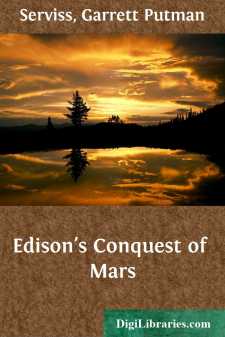Categories
- Antiques & Collectibles 13
- Architecture 36
- Art 48
- Bibles 22
- Biography & Autobiography 813
- Body, Mind & Spirit 142
- Business & Economics 28
- Children's Books 17
- Children's Fiction 14
- Computers 4
- Cooking 94
- Crafts & Hobbies 4
- Drama 346
- Education 46
- Family & Relationships 57
- Fiction 11829
- Games 19
- Gardening 17
- Health & Fitness 34
- History 1377
- House & Home 1
- Humor 147
- Juvenile Fiction 1873
- Juvenile Nonfiction 202
- Language Arts & Disciplines 88
- Law 16
- Literary Collections 686
- Literary Criticism 179
- Mathematics 13
- Medical 41
- Music 40
- Nature 179
- Non-Classifiable 1768
- Performing Arts 7
- Periodicals 1453
- Philosophy 64
- Photography 2
- Poetry 896
- Political Science 203
- Psychology 42
- Reference 154
- Religion 513
- Science 126
- Self-Help 84
- Social Science 81
- Sports & Recreation 34
- Study Aids 3
- Technology & Engineering 59
- Transportation 23
- Travel 463
- True Crime 29
A Columbus of Space
Description:
Excerpt
CHAPTER I
A MARVELOUS INVENTION
I am a hero worshiper; an insatiable devourer of biographies; and I say that no man in all the splendid list ever equaled Edmund Stonewall. You smile because you have never heard his name, for, until now, his biography has not been written. And this is not truly a biography; it is only the story of the crowning event in Stonewall's career.
Really it humbles one's pride of race to see how ignorant the world is of its true heroes. Many a man who cuts a great figure in history is, after all, a poor specimen of humanity, slavishly following old ruts, destitute of any real originality, and remarkable only for some exaggeration of the commonplace. But in the case of Edmund Stonewall the world cannot be blamed for its ignorance, because, as I have already said, his story remains to be written, and hitherto it has been guarded as a profound secret.
I do not wish to exaggerate; yet I cannot avoid seeming to do so in simply telling the facts. If Stonewall's proceedings had become Matter of common knowledge the world would have been—I must speak plainly—revolutionized. He held in his hands the means of realizing the wildest dreams of power, wealth, and human mastery over the forces of nature, that any enthusiast ever treasured in his prophetic soul. It was a part of his originality that he never entertained the thought of employing his advantage in any such way. His character was entirely free from the ordinary forms of avidity. He cared nothing for wealth in itself, and as little for fame. All his energies were concentrated upon the attainment of ends which nobody but himself would have regarded as of any practical importance. Thus it happened that, having made an invention which would have put every human industry upon a new footing, and multiplied beyond the limits of calculation the activities and achievements of mankind, this extraordinary person turned his back upon the colossal fortune which he had but to stretch forth his hand and grasp, refused to seize the unlimited power which his genius had laid at his feet, and used his unparalleled discovery for a purpose so eccentric, so wildly unpractical, so utterly beyond the pale of waking life, that to any ordinary man he must have seemed a lunatic lost in an endless dream of bedlam. And to this day I cannot, without a nervous thrill, think how the desire of all the ages, the ideal that has been the loadstar for thousands of philosophers, savants, inventors, prophets, and dreamers, was actually realized upon the earth; and yet of all its fifteen hundred million inhabitants but a single one knew it, possessed it, controlled it—and he would not reveal it, but hoarded and used his knowledge for the accomplishment of the craziest design that ever took shape in a human brain.
Now, to be more specific. Of Stonewall's antecedents I know very little. I only know that, in a moderate way, he was wealthy, and that he had no immediate family ties. He was somewhere near thirty years of age, and held the diploma of one of our oldest universities....






